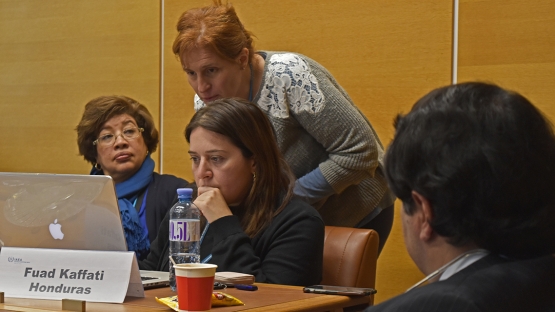Many IAEA Member States, most notably low- and middle-income (LMI) countries, lack the human and physical infrastructure with which to develop a comprehensive cancer control programme. Approximately one million patients in the Latin American and Caribbean region are diagnosed annually with cancer, and this number is rapidly increasing. It is predicted that by 2020, two thirds of new cancer cases will emerge in developing countries.
The IAEA works to increase the availability of, access to and quality of radiotherapy in its Member States. In response to Member State concerns regarding the rising incidence of cancer in the region, the IAEA launched a technical cooperation (TC) project at the beginning of 2016 to strengthen diagnostic and treatment capacities in the Latin American and the Caribbean region. Already, as a first step in establishing a base-line for planning purposes, the project coordinators have collected information on the human and infrastructure resources currently available in their countries. In March this year, a project coordination meeting took place in IAEA headquarters in Vienna, aiming to identify unexpected challenges and to explore future opportunities.
The meeting, which brought together 17 national representatives from 18 Member States in the region, namely Argentina, Brazil, Chile, Colombia, Costa Rica, Cuba, Dominican Republic, El Salvador, Guatemala, Honduras, Jamaica, Mexico, Nicaragua, Panama, Paraguay, Peru, Spain and Uruguay. was opened by Mr. Luis Longoria, Director of the Division for Latin America and the Caribbean, who stressed the need to strengthen capacities in cancer diagnosis and treatment. Participants attended presentations that covered a broad spectrum of subjects, from the success of past projects in the field of radiation therapy to the resources available in the IAEA’s Human Health Campus, an e-learning tool.
The meeting was also attended by His Excellency Gonzalo de Salazar Serantes, Ambassador of Spain, Dr. Juan José Rodriguez Sendin, President of the Board of Medical Doctors (Presidente de la Organización Médica Colegial de España), and Dr. Juan Martinez, Director of the Foundation for Research, Training and Professional Competency of the Medical Doctors of Spain (Director de la Fundación para la Formación de la OMC). The IAEA signed a Practical Arrangement with Organización Médica Colegial de España in October 2015.
Under this agreement, and within the umbrella of the ongoing regional project, the Organización Médica Colegial de España will support IAEA Member States in the region with training in radiation medicine and nutrition. Furthermore, the OMC is expected to develop interactive educational materials in Spanish for radiation medicine and nutrition, which will be posted on the IAEA Human Health Campus.


